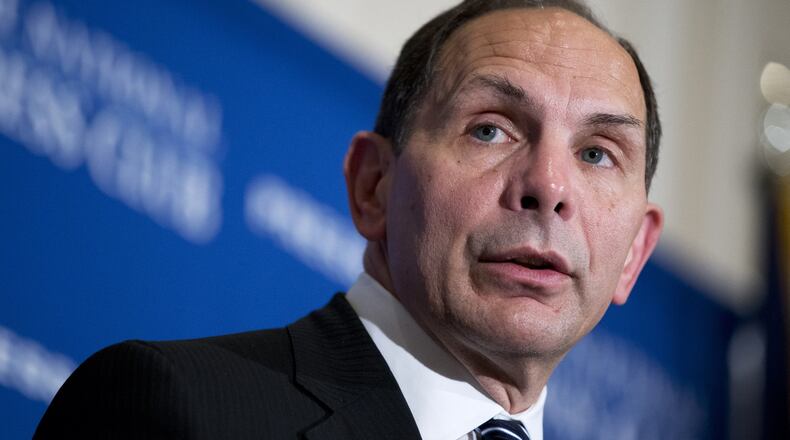Just a few months into the job, new Veterans Affairs Secretary Robert McDonald received a lot of attention this week about his efforts to try to turn around the scandal-plagued agency.
The big question: Will McDonald be able to change the culture at VA that was such fertile ground for widespread dishonesty that failed veterans? The agency of more than 300,000 employees suffered one its lowest moments in its history when a scandal broke earlier this year about falsified wait times that impacted thousands of veterans across the country.
On Monday, McDonald announced a reorganization to make the agency more customer friendly and easier for veterans to access benefits. The AJC published a story on Tuesday that examined his brief tenure.
During the reporting for that story, I spoke to management experts, including a professor from Emory University's Goizueta Business School, who say McDonald and the VA face a steep hill to turn the organization around so that it effectively serves veterans.
“His leadership will certainly be tested and I certainly hope he’s up to that challenge,” said Peter Topping, an associate professor who teaches leadership and organizational behavior at Emory University Goizueta Business School. “If I were working in the VA, what would I be looking for from my leader? I want someone who has complete integrity and is in the job to do the job and enhance the effectiveness of the VA more than enhancing their own political career.”
Topping said McDonald will have to lay out a vision for where VA needs to go, create a unified sense of purpose across a large organization with a number of powerful stakeholders and rebuild trust to repair many burnt bridges.
A lot has been made of McDonald's business experience as CEO of Procter & Gamble, an $85 billion company, but Topping said that does not guarantee his success in VA.
"It's not a business so you can't do it the same way," Topping said. "At the same time, his experience with a large organization over that kind of breadth and over that kind experience is important if he can bring best business practices and leadership principles into a government organization and understand the lay of the land of the government organization, then his past experience will be very valuable. If his past experience tells him I know how to do this and I'm going to do it just the way I did it before then it won't work. So much depends on him."
McDonald has faced mounting criticism from members of Congress and others for not getting rid of more top VA officials. That could soon change. He told CBS 60 Minutes on Sunday that he has given a disciplinary report of about 35 VA officials who could face termination to the Senate and House committees, and he has a separate discipline report of more than 1,000 officials in the VA who could face termination.
He will have to make significant leadership changes if he wants to transform VA's culture, according to James Clawson, the Johnson and Higgins Professor of Business Administration Emeritus at the University of Virginia. Many of the executives he inherited were partially responsible for the scandals.
One of the biggest challenges is “how to change the culture from being a self-serving institution to one that serves the people it was originally intended to serve,” said James Clawson, the Johnson & Higgins Professor of Business Administration Emeritus at the University of Virginia. “It’s a huge challenge.”
For McDonald, presumably he has about two years to effect change because a new president will get elected in November 2016. Without decisive and bold action, the opportunity to transform an organization can quickly slip away, Clawson said.
"The danger is it's going to suck you in like quicksand," Clawson said.
About the Author
Keep Reading
The Latest
Featured




